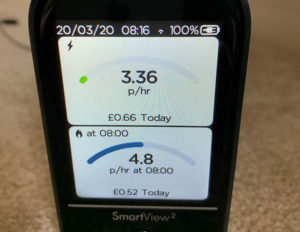
The benefits of smart meters
- Gives consumers accurate information about how much energy they are consuming. It updates in real-time. If you switch an electric heater on, you can see the smart meter go from 3 pence per hour to 40 pence per hour. This gives a very clear understanding of what it costs to turn on different appliances.
- Give an indication of how much you are spending and daily trends.
- Allocative efficiency. When we know how much something is costing, we can decide whether it is something we want to pay for. It encourages consumers to think about the marginal cost of leaving lights on and we will only do so if the value equals the marginal cost. Before smart meters, we don’t have an accurate idea of what an appliance costs and we tend not to think about it.
- Having a meter makes you think about energy use much more than a monthly direct debit – which is actually divorced from your daily use, but just an average of the year.
- A smart meter encourages energy conservation and therefore helps to reduce carbon emissions and is better for the environment.
- You never need to do another energy reading again. It reduces costs for firms as they don’t have to send a worker to read bills. Hopefully, these cost savings will be passed onto consumers.
- It can also reassure you that some things are actually very cheap to run, e.g. turning a 20 watt light bulb on, only costs a fraction of one pence for an hour.
Cons
- It can make you constantly check the smart meter to see how much you are spending. Making life less peaceful as you think a lot more about the cost of turning a light on. Or if you turn a heater on, you are perhaps more likely to be thinking you are going to go above a daily budget. I have got fed up with it from time to time and turned it off. But, then I get intrigued and turn it back on.
- It is another wireless signal in the house. Although research is still at early stages (wireless is a relatively new phenomenon) there are concerns that wifi signals can contribute to cancer and brain tumours. Now I know how much everything costs, I’d actually prefer to go back to old system, but I don’t think electric company will allow.
Smart meter and behavioural economics
I got a smart meter last week, and I can’t believe how much it has influenced my behaviour. The truth is that over the past several years I only had a vague idea how much I was paying for energy. There was a monthly direct debit which sometimes went up, sometimes down, but I never thought about it that much.
In my book “What Would Keynes do?” I even had a chapter on why an economist would not waste time turning light bulbs off if the cost of time was greater than the cost of the electricity.
As soon as I got a smart meter, it has become like a ‘game’ to keep the daily energy use below £3.00. I do my morning meditation under a big duvet, rather than leave an electric heater on for a few hours.
I’ve found it’s much cheaper to boil water for a cup of tea using the gas cooker rather than an electric kettle, and in a way, it’s just as simple to turn the gas cooker on as kettle.
The average temperature of the house has gone down from 24 degrees to 21 degrees (I get cold hands, so it’s a bit annoying. Not sure how much this new austerity will last)
The timing of the smart meter is also ironic. We are entering a period of self-isolation, living and working from home, so all day at home, checking smart meter has become a kind of distraction. It’s almost become like a game – aiming for new PB, of the lowest daily cost. I am looking forward to warmer weather and longer days!
Also, it feels like the whole world is entering a new age of austerity. The economy is going through an incredibly difficult period – where nearly everyone might see a significant fall in income. My spending habits have abruptly changed in the past few weeks. I am being much more careful with my money, so a smart meter came along at just the right time. I think I will cut my energy bills by 40-50%. It is that dramatic. Though I was fairly liberal with my use of energy before.
Maybe we need smart meter leader boards so we can compete with neighbours who can reduce energy the most?

At last! Someone else who has realised that using gas to boil water for a drink is up to a quarter or a fifth the cost of using electricity to do the same job. My energy unit prices see electricity units costing 5 times those for gas! I figured this out years ago, and didn’t need a smart meter to tell me! Here’s another thought – who pays for the electricity used to power the smart meters and their radio frequency transmitters? Who pays for the energy to power the smart meter display unit? Nobody ever mentions this!
Does a smart AMI water meter work properly at sea level, or can it be faulty?
I had a smart meter fitted today. I have been given a smart View3 to display costs etc. It is saying I have 23% battery?